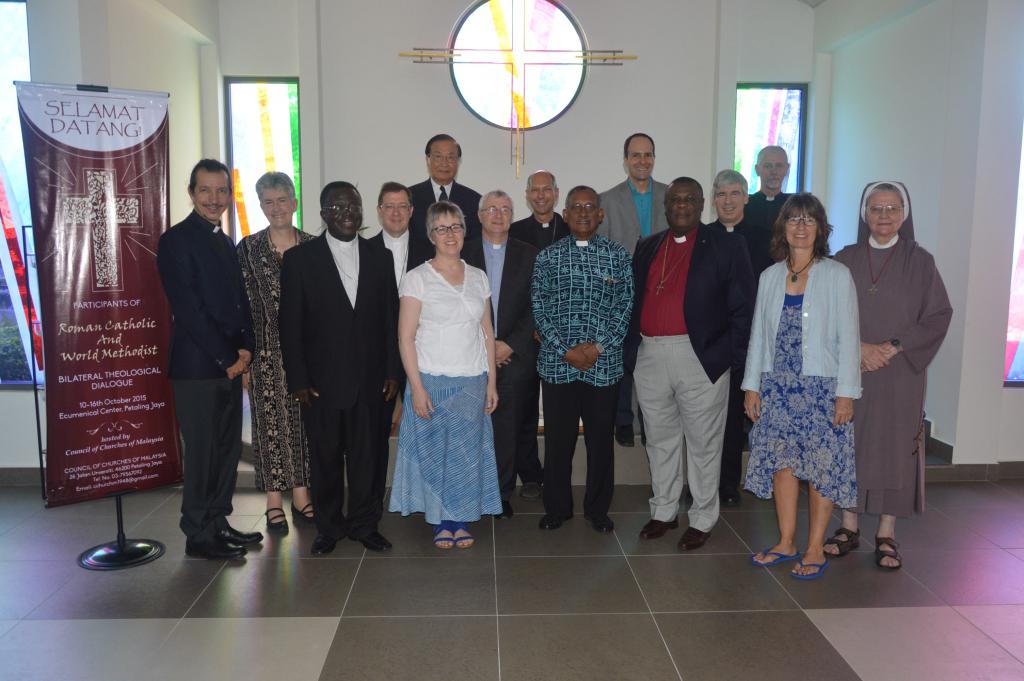In October, the Joint International Commission for dialogue between the World Methodist Council and the Catholic Church met in Kuala Lumpur. Bishop John is a member of the commission and here shares his experiences of meeting Christians in Malaysia.
It was the fourth meeting of the current dialogue which had been tasked with preparing a document for the World Methodist Council meeting in Houston in 2016. The document will focus on the ways in which Catholics and Methodists understand the call and path to holiness and will be entitled, The Call to Holiness: From Glory into Glory.
The decision to meet in Malaysia had been a joint decision of the World Methodist Council and the Pontifical Council for Promoting Christian Unity, the two bodies who sponsor the dialogue and to whom we ultimately report. The aim was to support Christians and ecumenical dialogue in the countries which we visited. Christians in Malaysia comprise about 9% of the population of 28million. About 61% of the country is Muslim, 20% Buddhist, and 6% Hindu.
While we were in Kuala Lumpur, we joined a celebration to mark the 55th anniversary of the foundation of the Catholic Teachers’ Federation at which Archbishop Julian Leow, who was celebrating the first anniversary of his episcopal ordination, spoke passionately about his dream to rebuild Catholic education with a sound curriculum and a clear Catholic identity.
A number of religious orders were honoured for their contribution to Catholic education in Malaysia over many years. In particular Sr Enda Ryan, FMM from Co Limerick, the Leader of the Canossian sisters, spoke about their former houses in Welwyn Garden City and Cheshunt. Br Anthony Rogers, a La Salle brother, whose life had been committed to education, spoke about his present work to protect the human dignity of workers in the mining industry.
Mass on Sunday was celebrated at St Francis Xavier Church, a Jesuit parish with a congregation of 4,000 people on Sunday. We heard of a retreat to be held in Advent and the need to book early because of limited places: only 600!
We later joined the Trinity Methodist Church for worship; again a large congregation of several hundred people. This church was being rebuilt and will have an auditorium to seat 900 people. It is wonderful to experience such vibrant and warm communities.
I met a number of Christians in Kuala Lumpur who were fearful about the future and asked me if I knew about the 2014 High Court ruling which had declared that use of the name of God as ‘Allah’ (used by Malay speaking Christians) was restricted to Muslims. This ruling has led to some incidents of the seizure of bibles and hymn books which have been subsequently desecrated and raised fears amongst Christians. Formerly most Christians living on the Malaysian peninsular had Chinese or Indian descent. Christians from East Malaysia have an indigenous origin and speak Bahasa Malaysia.
In response to this ruling Archbishop Leow, in a recent pastoral letter, wrote, ‘We do not know what the future holds or what the repercussions of the decision of the Court of Appeal will be on rights of the minorities to practise their faith in the manner they consider in keeping with their religious practice, but we do know that we are a people of Faith and Hope.’
I encourage you to pray for the Christians in Malaysia and to find out more about the situation. In a country with a small Christian minority, the ecumenical need to pray, understand one another and serve together because we share a common baptism is a necessary imperative.
We also visited the Hindu shrine of Murugan at the Batu Caves where many worshippers bring gifts to the gods and newborn babies are dedicated. Malaysia has a rich and complex mix of religions and diversity of peoples from many different origins which makes it colourful and fascinating.
With this rich experience, we began to work on the document to be completed for next year. Draft chapters on anthropology, the Church, the path to holiness and the life of Christians in the world, and the life of ‘saints above’ were examined and received critique. My preliminary work had been in dialogue with Methodist Rev Dr Trevor Hoggard, who was formerly a Methodist minister in Derby and then served at the Methodist Church in Rome. Its focus has been the ‘four last things’: an examination of Catholic and Methodist understandings of death, judgement, heaven and hell.
The most interesting discussion has been concerned with the Catholic understanding of purgatory and some Methodist understandings of purification beyond the grave. Pope Benedict XVI’s encyclical The Hope That Saves (Spe Salvi, 2007) has provided interesting material for debate as has Blessed John Henry Newman’s Dream of Gerontius.
I flew home with a much greater understanding of the situation of Christians in Malaysia and the need to find out more and to pray for the Church in a difficult situation.




